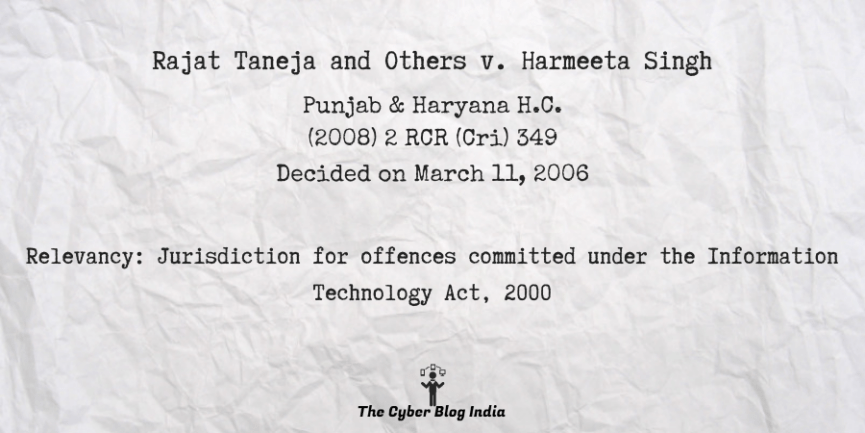Rajat Taneja and Others v. Harmeeta Singh

Rajat Taneja and Others v. Harmeeta Singh
(2008) 2 RCR (Cri) 349
In the High Court of Punjab and Haryana
Crl. Misc. Petition 68896-M/2006
Before Justice Mahesh Grover
Decided on March 11, 2006
Relevancy of the case: Jurisdiction for offences committed under the Information Technology Act, 2000
Statutes & Provisions Involved
- The Information Technology Act, 2000 (Section 43, 44, 45, 46, 65, 66, 67, 75(2), 78, 87)
- The Indian Penal Code, 1860 (Section 120B, 406, 420, 498)
- The Code of Criminal Procedure, 1973 (Section 156(3), 482)
Relevant Facts of the Case
- The respondent was married to the petitioner in 2002 and both of them lived together in the US. They were not in good terms and thus, their marriage was over.
- The respondent’s tourist visa was expired in September of the same year. She flew down to India and lodged a complaint against the petitioner in Gurgaon under Section 406, 420 and 498 of the Indian Penal Code, 1860 and Section 3 and 4 of the Dowry Prohibition Act, 1961.
- During the proceedings, some e-mails from the respondent were produced to prove the petitioner’s innocence and falsity of the allegations. The petitioner was accused of hacking as the petitioner procured the respondent’s emails without her consent. The petitioner did not have access but he still used it to get anticipatory bail from the Court of Additional Sessions Judge, Gurgaon and so it amounted to an offence under Section 66 of the Information Technology Act, 2000 r/w Section 120B of the Indian Penal Code.
- A petition was filed by the petitioner under Section 482 of the Code of Criminal Procedure, 1973, quashing the complaint filed under Section 66 of the IT Act r/w Section 120B of the IPC.
Prominent Arguments by Advocate
The petitioners’ counsel:
- It was argued that the bail was granted in November 2002 and the complaint about hacking was filed in September 2003. The complaint was filed late and it does not disclose any act offence under Section 66 of the Information Technology Act, 2000.
- It was also submitted that the Magistrate had no jurisdiction to summon the petitioners for the complaint filed by the respondent. This is because the Act has laid down ways of redressal and penalising the person committing an offence under the Act. This is raised with reference to Section 46 and 78 of the Information Technology Act, stating the role of adjudicating officer and investigation.
The respondent’s counsel:
- It was submitted that the prayer made in the complaint was to refer the matter under Section 156(3) of the Code of Criminal Procedure, 1973. There is no issue with passing the summoning order because it was established prima facie that the offence was committed under Section 66 of the Information Technology Act, 2000 r/w Section 120B of the Indian Penal Code, 1860.
Opinion of the Bench
- The bench held that the framers of the Act had laid down the provisions in such a way that some provisions will not have penal consequences and only monetary compensations. However, under Section 65 to 67, the act invites penal as well as monetary compensation.
- Also, to ascertain that the offence was committed under Sections 65 to 67, the Deputy Superintendent of the Police has to look into the matter further.
- The Judicial Magistrate had no power to summon the petitioners on the complaint filed by the respondent. The adjudicating officer could only look into such matters.
Final Decision
- The petition was allowed based on the reasons above.
